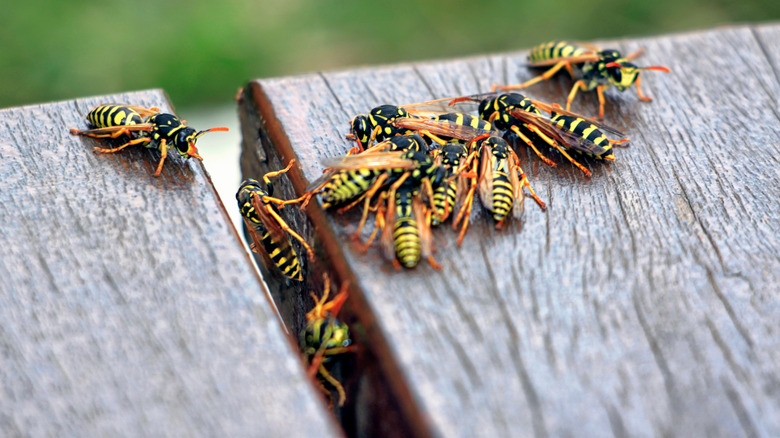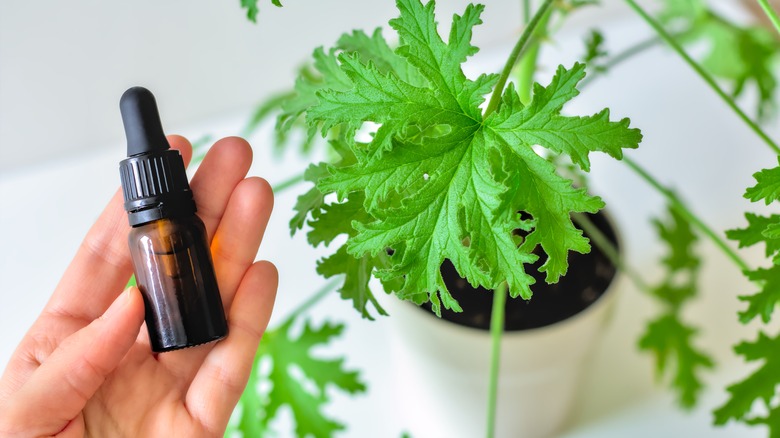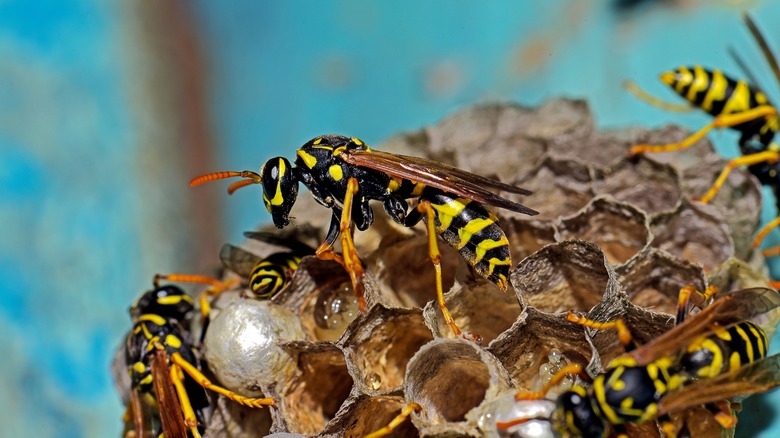Does Citronella Oil Work To Repel Wasps And Yellowjackets?
We may receive a commission on purchases made from links.
It's thought that up to 7% of people have had reactions after being stung by an insect, and Allergy Insider reports that upwards of 48% of people experience anaphylaxis. This is why insects such as wasps and yellowjackets should be met with extreme caution. You can hide indoors, but when the sun and fresh air come calling, it's important to know how to avoid these insects outside as well. One great trick involves using citronella oil. It's thought that these pests dislike anything citrusy, like the scent of citronella, as these overwhelming fragrances can affect a wasp's senses. If you want to use this potent oil to repel stinging insects, you could use citronella candles.
As you look to deter these pests, you might find yourself wondering if wasps and yellow jackets are the same thing. Yellow jackets are a type of wasp and are typically smaller. Unfortunately, they're also very aggressive, making repellents such as citronella oil an affordable solution. You can buy a two-pack of decorative citronella candles on Amazon for $18 (at the time of writing this). Purchasing citronella oil to fill torches is also a budget-friendly way to keep wasps out of your backyard, but you should be aware of potential fire hazards, burning them away from anything flammable. Additionally, citronella can cause skin irritation, especially in children, and is toxic to pets. If you're worried about any of the above, there are other ways to keep wasps at bay as well as using citronella oil.
Try citronella or other plants to repel wasps
A study in Pest Management Science showed that 17 out of 21 essential oils repelled yellow jackets, citronella included, so using citronella candles or oils can work to prevent wasps from invading your outdoor space. Planting citronella may also be a good idea, but this also exposes children and pets to this toxic plant. Instead, you could try growing something else to deter wasps. For example, regular thyme can work, but avoid planting Spanish thyme, as it's also toxic to pets.
Other plants to consider include marigold flowers, which can deter yellowjackets naturally, as well as planting mint – another strong scent. Just be mindful that there is a type of mint that can be bad for your dog or cat at home. As with anything, it's best to know all about the plants you should never grow in a house with pets.
You can also take precautions to avoid wasps in the first place. For example, you'll commonly find more wasps in July. This doesn't mean you won't see them other times of the year — they're usually out in the summer and fall. They search for safe places to nest and reproduce, which means you might see hundreds of wasps come July, putting you, your family, and your pets at risk of dangerous stings. To prepare yourself, get ready before summer hits.
Know how to avoid wasps
Wasps can sting repeatedly, which makes them a significant threat. And since wasps are particularly aggressive from the summer to the fall, you should take extra precautions when outside. For example, be on the lookout for nests so you know what areas to avoid. If you see one, contact a professional to remove it. Wear protective clothing, including socks and shoes, to avoid stepping on a wasp or yellow jacket. Don't flail when wasps are near, either, as this can set them off. Stay still when they approach you and if you have to make a run for it, run in a straight line and don't swing your arms. Avoid bright-colored clothes or anything with floral prints as well, and stay away from perfume and aftershave with a sweet scent. The same goes for shampoo or hair products.
It's also important to know how to identify wasps and yellow jackets, as this will help you to avoid them. Paper wasps are typically brown, have different types of yellow markings on them, and are upwards of 20 mm long. Yellow jackets are upwards of 16 mm long, are shiny, and their abdomens are black and yellow. They commonly nest in the ground, making proper footwear essential when outdoors. Hornets are also wasps, so keep an eye out for anything with black and white rings or even yellow-orange stripes on a brown body. If you think you have an infestation, it's best to contact a professional pest control technician right away.



